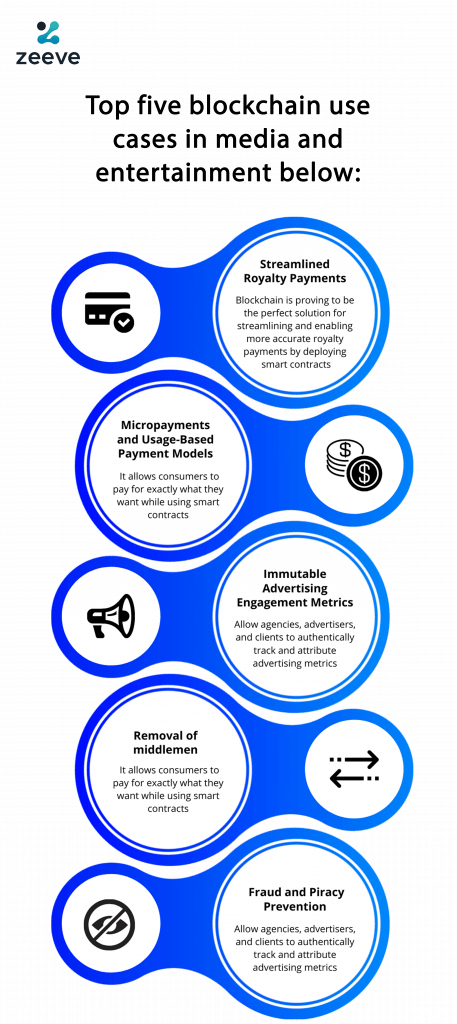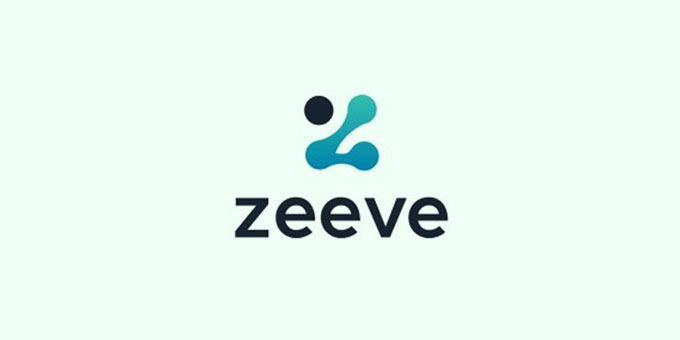Blockchain technology is rapidly becoming mainstream with major industries- from finance to telecom, to healthcare, automotive, supply chain, and also retail exploring the possible blockchain technology benefits. However, media and entertainment are typically one of the most underrated industries we rarely think of when it comes to the deployment of distributed shared technology. But the interesting thing is that media and entertainment are particularly ripe for a blockchain revolution and they stand to gain immensely from the plethora of advantages that the blockchain offers.
Deploy blockchain nodes on the network with Zeeve to solve the pressing problems plaguing the entertainment sector. Blockchain in entertainment industry helps artists and content creators get their dues, in terms of revenues, copyrights and also support for tackling piracy and fraud.
In this blog, we would take a deeper look at the existing challenges plaguing the media and entertainment industry, the ways blockchain in entertainment can resolve those problems, and also work in favor of all those associated with these industries. We would also evaluate some interesting questions pertaining to the impact of blockchain on the current media processes and the value chains, the opportunities for the technological revolution to open more revenue generation avenues, and also the future of the domain.
Blockchain in entertainment industry overview
The decentralization of global systems and processes has already begun, with some industries at the cusp of a perceivable shift. The major impact of the decentralized system is already felt on finance, supply chain, food chain, and healthcare and now music enterprises, content creators and start-ups in the entertainment field have started exploring how blockchain implementation can impact their business. Although the smart contracts powered by the blockchain are yet to make major transformations in the entertainment sector, they could influence the entertainment agreements and pave the way for a safe, secure option to traditional negotiations. Besides, the deployment of blockchain networks can set up the entertainment industry for better and more trustworthy payment ways for creators and facilitate seamless engagement means for the crew on global projects, thus eliminating the hurdles that hamper the future prospects of entertainment players.
Experts too believe that investments in the crypto and blockchain-based solutions can power up the entertainment firms, re-inventing their business functions and also facilitating fast safe, transparent, immutable, traceable, and secure transactions across the wide entertainment and music market.
The revolutionary blockchain technology, unobstructed by geographical limitations can give content creators as well as end consumers alike the required access to engage freely that they weren’t able to do in the past. The bigger advantage of blockchain deployment is that filmmakers, entertainment players can now readily access financing and tap into a vast pool of resources facilitated by the investors and the crowd-funding platforms. With funds flowing into the system, media and entertainment firms powered by the blockchain solutions can address their major challenges. Moreover, they can leverage the solutions to get a better perspective on ways to get their content distributed.
Blockchain’s integration with new technologies
The advanced technological progress in technical applications such as virtual reality, esports, gaming, 5G technologies each provides for a valuable case study of how the integration of blockchain in these disruptive sectors affects businesses. The integrated technological innovations help each of these subdomains grow significantly and advancements can aid each of them to achieve exponential growth, while also dynamically transforming the social and economic boundaries. We highlight a few of these technologies that further help the blockchain enthusiasts to grow their knowledge beyond the craze and buzzword that it generates and also discuss in brief their joint scope through their integration.
VR and blockchain
Of late, there is a lot of discussion around the advanced area of blockchain developed dedicated to virtual reality (VR) applications that have achieved immense growth over the last few years. While several VR and blockchain integrated programs remain under development, they have already gained traction, attracting potential investors to user numbers. A popular instance of this is the VR platform – Decentraland, which signifies the first virtual world connecting the VR to blockchain technology using Ethereum. It manages property rights through a blockchain ledger. Users use the VR devices to connect on the platform and participate while also enjoying an immersive virtual environment experience. The platform has been able to raise US$75 million in market capitalization and attracted nearly 18,000 users. Other projects that are fine examples of how the virtual world and blockchain provides world-class unique experiences are VibeHub and Cappasity offering online events or 3D content in exchange for crypto tokens.
Blockchain and film industry
When major industries are catching up with the trend of blockchain deployment, can the film industry be left far behind? It is gradually embracing blockchain and NFTs even as governments across countries are mulling steps to regulate these markets. Hollywood studios were already seen making the move towards introducing exclusive NFT collections of film characters through blockchain firms and operating a digital marketplace for commercialization of these tokens. In fact, the blockchain technological integration in the film industry and the rise of digital collectibles have brought forth endless possibilities for the industry players, narrators, production houses, and icons in the entertainment industry.
Blockchain and gaming
Blockchain technology and gaming as part of the broader entertainment industry are said to be a case study of the constructive engagement between cryptocurrency and video games. The distributed ledger technology resolves a number of problems in the gaming industry, right from the security concerns, ownership of in-game assets, value projection of intangible, digital assets, and providing rewards and also control to gamers.
Blockchain in esports
The decentralized technology can bring the different stakeholders of the esports industry under one roof and help them connect on the same platform. Amateurs along with the professionals can benefit immensely to manage the prize money distribution process, media rights, advertising, and transfer of players and so on. The transparency feature of blockchain technology will help esport developers and players to engage in seamless, transparent functions and secure their work without providing anyone unauthorized access to it. The secure database can help mitigate the higher costs with blockchain deployment in esports.
Challenges facing the entertainment and media industry
Apparently, the global media and entertainment industry is mired in several hurdles that make it difficult to prosper and make rapid strides. Some of these challenges include the following:
Infringements of the Intellectual property rights and content piracy:
The most common problem faced by musicians, content creators, artists and also the game developers is an infringement of their intellectual property rights (IP). The big music groups or even some individuals often violate the rights of artists to have complete authority over their music pieces or their intellectual property often in the manner that they distribute or access the content without having to pay for it. However, the peer-to-peer (P2P) programs increase the difficulty level of content creators and media players to monitor and track their content as to how and who and when are they accessed and distributed, thus promoting their online piracy of content/data or music files.
Intermediaries eating into the revenue shares of content creators
Creators often find themselves at a great disadvantage because of the presence of middlemen who eat into their profit margins. Often the creators in the entertainment and media industry are forced to take the help of intermediaries in order to reach out to a wider audience. Also to get their IP rights protection they are forced to pay a premium which is then passed on to the end-users, thereby increasing the overall cost. The digital management rights (DRM) software does not prevent the cases of hacking.
Lack of clarity and transparency with royalty agreements
The market share for music, good quality entertainment content is quite lucrative and throws exciting opportunities for content creators. With more and more streaming sites gaining more prominence, content creators get enticed to enter into agreements with the emerging platforms. The main form of revenue for entertainment industry players is royalties but they are not guaranteed access to fair compensation. The vague royalty arrangements and absence of accurate metrics for content consumption monitoring further bring down the royalty share of creators. What deals a further blow to the entertainment players is the monopoly of intermediaries. Some middlemen illegally control the payment ecosystems in the industry thereby leading to delayed compensation for the creators.
Unsecure and complex transaction processes
Monopolistic middlemen not only eat into the revenue shares of the content creators but also make the transaction processes pretty complex and unsafe. Unsecure and slow transactions often discourage new entrants to come into the domain and churn out quality entertainment content.
Inefficient content micropayment systems
Last, of all, a number of media and entertainment platforms, especially the newer ones and the smaller and more independent ones often face difficulty in accessing the efficient and cost-effective micropayment systems. They find it challenging to transact seamlessly and get control of efficient payment methods. Hence, the content creators and entertainment industry players cannot ride the wave of growth and fail to tap into the endless opportunities as well as reach out to a wider consumer base. The consumers also show no interest in becoming a long-term members and only make one-off purchases of video files and music pieces that interest them.
Resolving critical challenges with blockchain in entertainment industry
Blockchain holds the immense scope to tackle the challenges plaguing the media and entertainment industry and also re-invent the way in which all kinds of content such as music, video, and other forms of files are distributed, consumed, provided, and also paid for in the sector. The existing content management systems lack the framework in which existing entertainment players and new entrants can realize their customized content and service bundles. The digital ecosystem of today has made it challenging for the players to manage their digital content consumption rights and has posed a serious threat on how they can access royalty collections and carry forward smooth transactions amid the presence of a number of intermediaries.
Improve media supply value chains and track infringements with blockchain in entertainment
The distributed shared ledger technology with its decentralized processes can enhance the media supply chain and also bring down the incidences of intellectual property and copyright infringements of entertainment files, content, and music streaming. For example – the cases of copyright violations in music streaming can come down in numbers with the adoption of blockchain in the entertainment industry.
Monitoring the cut down in streaming royalty collections
Publishers, composers, content creators, and songwriters often accuse the music streaming channel providers such as Spotify, Napster, and Pandora of not giving enough payment of they are eligible to receive. In a lot of cases, the streaming royalties amounting to as much as 25% are not given to the entitled creators. Blockchain in entertainment with its advanced solutions can help content creators get their due and receive streaming royalties without many hassles.
Facilitating transparency and tapping right consumers
The deployment of advanced blockchain in entertainment solutions also helps in facilitating transparency in the system, thereby keeping a check on how the intermediaries are eating into the marketing companies’ budget and content creators’ share at every step of the process. A report shows that merely 38 to 46% of the advertising spends are directed towards the planned media outlet. The adoption of blockchain technology is intended towards tapping the right target audience with more relevant ads in a timely and well-directed manner, thereby mitigating the advertising costs and reducing the overall burden. It also aims to drive more advertising revenues through a focused approach.
Tracking fraudulent activities with blockchain in entertainment
Besides, fraudulent activities can also be tracked with the adoption of blockchain in the entertainment industry and media. The ad techniques powered by blockchain can catch domain spoofs, bot networks and also clicks that are not enacted by humans. Juniper Research report suggests that the losses of entertainment and the advertising world can touch up to USD 44 billion by 2022 for the fraudulent activities. However, the implementation of blockchain in entertainment can mitigate the losses and also significantly push up the profits for small firms.
Monitoring performance of ads and publishing rights
Businesses in the media and entertainment industry can keep a tab on the ads and align the truth through the self-executing codes – smart contracts. For instance, if the advertising imprints and the view ability are reliable and can be monitored then the payments can be automated and disputes arising for it are reconciled. Performance tracking of the ads and the publishing rights can also be monitored through a reliable system of record. The distributed ledger technology powered by smart contracts can help in automating dispute resolutions and payment reconciliations.
Efficiency and other additional benefits
Blockchain in the entertainment industry and media can function efficiently within their framework as the technology supplements transparency, immutability, cost optimization, provenance, and also consensus. It also aids in tamper-proof functionality and detects fraud. Besides, the content quality, improvement in data, enhanced trust, and reduction in the incidences of disputes can be brought forth by the introduction of blockchain.
With decentralization underway, players in the entertainment and media can make optimum gains from the deployment of the blockchain-powered processes. Content micropayments can be managed effectively, content aggregation can be eliminated, consumer sales can find end-to-end support and more trustworthy and accurate royalty distributions can be followed with blockchain in entertainment industry deployment.
Popular use cases of blockchain in entertainment industry
A number of entertainment and media firms have begun their blockchain journey for leveraging the various advantages and also removing the critical obstacles that crop up in the way to their growth. Some popular use cases of blockchain in the entertainment and media industry as identified are the following:

Blockchain in entertainment facilitating P2P sales and content distribution
Content creators and artists can use Ethereum to automate a larger chunk of the business administrative work such as payments, contracts, licensing, and accelerate their processes. The contractual-work involving the middlemen is complex, slow, insecure and also rife with a number of problems. However, the adoption of blockchain automates the system where the role of intermediaries is eliminated and all activities can be performed at the fraction of the cost. Moreover, blockchain in the entertainment industry allows creators to engage in peer-to-peer sales and distribution, thus getting their due without having any middlemen cut into their share of profits. Both the creators and consumers stand to gain immensely with the introduction of blockchain-based marketplaces for digital content and the removal of expensive intermediaries.
Streamline royalty payments with blockchain technology
Artists and content creators hold the publishing rights and control licensing to manage their content distributions and upload original works. Smart contracts programmed with royalty payments are present for every content piece and payments for each one of them can be automatically paid to the creator basis the usage model.
Blockchain can create new pricing options for paid content
In today’s digital content world where consumption of quality digital content has spiked and consumers are spoilt for choices when it comes to streaming services, there is vast opportunity for the pay-per-use consumption-based models. Apparently, the customers are paying well to access advertising platforms and media channels such as Tidal, Amazon Prime, Netflix and also YouTube. The introduction of blockchain technology maintains an elaborate record of the media-usage data and also facilitates the well-organized micropayment pricing models.
Entertainment and media companies which made use of blockchain
Vezt, supported by Sony and BMG, intends to hold the first rank in the music rights marketplace that shares with fans the royalty payments of recordings and songs they love. Funding sourced directly from the fans is used to help artists, songwriters, and producers. Copyright of all songs are encoded in smart contracts and royalty payments are tracked on-chain. A certain percentage of the song’s rights are offered on sale to fans of those songs that helped their desired artists achieve those heights of popularity.
Digital rights management and ownership of data, media files are tackled by Verifi. It aims to synchronize ownership across stakeholders – from the label producing the song, songwriter, artists, and also the streaming service platform.
Comcast collaborated with NBC Universal, Disney, Channel 4 and others in 2018 for the Blockchain Insights Platform to sync the targeted consumer data sets without explicitly making the complete data public and to better plan, target, execute as well as measure the metrics and quantity ad performances.
FilmChain operates on the Ethereum blockchain network with an aim to collect, distribute, and measure revenues from TV, films and sources of digital media. The prime objective of this is to build transparency in the distribution cycle and also offer compensation to stakeholders without involving the intermediaries. Projects on this Ethereum-based platform can attract global funding and also draw more and more global audiences.
Spotify – the music streaming platform’s recent acquisition of Mediachain Labs – blockchain start-ups shows a progressive step towards how the blockchain is aiding in providing technological innovation and technical support to connect artists, stakeholders and copyright owners with the songs that are hosted on Spotify’s service.
Audius has taken up blockchain-based network support to beat its rival – Soundcloud with the support of Lightspeed Ventures, General Catalyst, and Kleiner Perkins. It aims to give back the major chunk of the revenues back to content creators and also guarantees higher view ability as well as fan engagement for new artists.
Future of Entertainment
The growth of the entertainment industry over the past few decades has been noteworthy. However, the problem with the sector has been the dominance of only a few creamy layers of content producing companies and music recording biggies making enormous sums of money while the majority being denied their dues. The increased consumption of digital content and rise of streaming service platforms has transformed a lot of the scenario. However, the problems pertaining to fair revenue distribution and piracy remain the big elephant in the room that still needs to be addressed. Challenges cut down on the profit share of artists that they are entitled to receive. The blockchain technology adoption and acceleration of blockchain solutions development can provide the much-needed remedy for the problems plaguing the sector. The mass adoption by more and more entertainment and media firms can encourage the industry to move towards a fair, transparent, and better approach, while it can also present practical steps that modify the way we use media and consume content.
Zeeve as Devops partner for enterprise blockchain implementation
Zeeve is the primary blockchain infrastructure services provider empowering start-ups and enterprises to build, deploy and manage reliable decentralized apps and Blockchain networks. It is a no-code automation platform providing support for various blockchain protocols. It features a powerful set of APIs and has experience in designing various enterprise solutions in the blockchain space. Zeeve supports Decentralized Finance (DeFi) space with decentralized storage, trusted nodes, and smart contracts.
For more details about deploying and managing blockchain nodes and networks for your entertainment projects, contact us today!






















